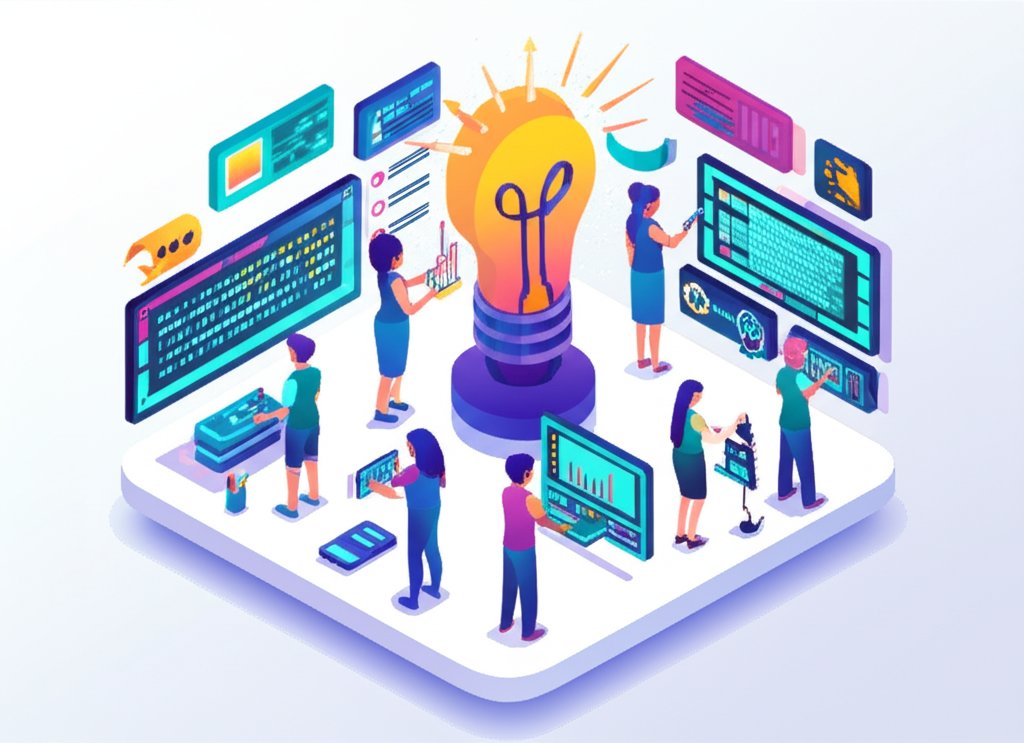In the vast tapestry of human history, certain individuals stand out – not just for their brilliance, but for their profound ability to alter the course of society itself. These are the Revolutionary Prodigies, rare individuals whose extraordinary talents and audacious visions ignite Societal Movements, giving birth to Revolutionary Ideas that challenge the status quo and carve out an enduring Legacy of Changemakers. They are the architects of transformation, proving that a single mind, nurtured by conviction and courage, possesses the power to reshape the world.
This article delves into the phenomenon of these exceptional individuals, exploring what sets them apart, how their ground-breaking thoughts translate into widespread action, and the indelible mark they leave for generations to come. From the quiet genesis of an idea to the thunderous roar of a revolution, we will uncover the intricate dance between innate genius, unwavering resolve, and the collective will to evolve.
Decoding Revolutionary Prodigies: The Genesis of Extraordinary Talent
The term “prodigy” often conjures images of child geniuses mastering complex skills at an early age – a Mozart at the piano, a Chess prodigy at the board. However, a Revolutionary Prodigy is more than just a person with exceptional innate talent. It is someone who harnesses that talent, coupled with a unique insight and courage, to fundamentally challenge existing paradigms and drive transformative change on a grand scale. They don’t just excel within a system; they often seek to redefine or dismantle it.
Beyond Childhood Genius: Defining the “Revolutionary” Aspect
While many Revolutionary Prodigies exhibit signs of genius early in life, their “revolutionary” quality lies in their distinct application of that genius. It’s not merely about solving complex equations or composing symphonies, but about seeing beyond the obvious, identifying deep-seated injustices, or conceiving entirely new ways of organizing society, science, or thought. They are often profoundly empathetic, acutely aware of suffering, or possess an unparalleled foresight into future possibilities. Their gifts manifest not just as technical skill, but as a deep understanding of human nature and societal mechanics, allowing them to formulate compelling Revolutionary Ideas that resonate widely.
Nurturing the Spark: Environment and Intrinsic Motivation
The emergence of a Revolutionary Prodigy is rarely a matter of raw talent alone. While innate predisposition is a factor, the environment plays a crucial role. Supportive mentors, access to knowledge, exposure to diverse perspectives, and even direct experiences with injustice can all shape these individuals. Critically, these prodigies are often driven by an intrinsic motivation that transcends personal gain. They are compelled by a deep sense of purpose, a burning desire to right wrongs, or an insatiable curiosity to unravel the universe’s mysteries. This internal fire, combined with external encouragement and a conducive learning environment, transforms potential into transformative power.
The Anatomy of a Changemaker: Traits, Vision, and Tenacity
At the heart of every significant Societal Movement or paradigm shift stands a Changemaker. These individuals, often but not exclusively, are the Revolutionary Prodigies who possess a unique constellation of traits allowing them to not only conceptualize radical change but also to inspire and lead others through its often arduous path.
Visionary Thinking: Crafting Revolutionary Ideas
What distinguishes a Changemaker is their capacity for visionary thinking. They are not content with incremental improvements; they envision a fundamentally different and better future. These Revolutionary Ideas often seem audacious, impractical, or even dangerous to contemporaries. Think of Mahatma Gandhi’s concept of nonviolent civil disobedience against colonial rule, or Mary Wollstonecraft’s radical advocacy for women’s rights in the 18th century. These were not just new thoughts; they were complete reframings of existing power structures and human potential. They required a unique intellect to formulate and immense courage to articulate in hostile environments.
Unwavering Resolve: Overcoming Adversity and Fueling Willpower
The path of a Changemaker is invariably fraught with challenges. They often face ridicule, opposition, persecution, and even violence. The resilience to persist in the face of such adversity is a defining characteristic. Rosa Parks’ simple act of defiance on a bus in Montgomery, Alabama, was not an isolated event but the culmination of profound personal conviction and an unwavering belief in justice. Similarly, Nelson Mandela endured decades of imprisonment, yet emerged with his vision for a free and equal South Africa unblemished. This extraordinary mental fortitude, coupled with an iron will, empowers them to inspire perseverance in others, making them pivotal in sustaining Societal Movements through their darkest hours.
The Power of Communication: Inspiring and Mobilizing
Ideas, however brilliant, remain dormant without effective communication. Changemakers are often masterful communicators, capable of articulating their Revolutionary Ideas in ways that resonate deeply with the common person. Whether through powerful oratory, compelling writing, or symbolic actions, they can galvanize diverse groups to unite for a shared cause. Martin Luther King Jr.’s speeches, for example, did more than inform; they stirred souls and fostered a collective consciousness that propelled the Civil Rights Movement forward. Their ability to translate complex philosophies into accessible, emotionally charged messages is crucial for transforming individual hope into collective action.
Igniting Societal Movements: From Idea to Widespread Action

Societal Movements are not spontaneous eruptions of discontent; they are often the culmination of long-simmering grievances, given direction and momentum by Revolutionary Prodigies and Changemakers who provide the compelling narrative and strategic leadership.
The Tipping Point: When Ideas Catch Fire
A Revolutionary Idea, once articulated by a credible Changemaker, can sometimes reach a “tipping point.” This is the moment when a critical mass of people adopt the idea, share it, and act upon it. Factors contributing to this include widespread dissatisfaction with the status quo, the timely emergence of a charismatic leader, and the creation of communication channels (whether pamphlets, public gatherings, or digital platforms) that allow the idea to spread like wildfire. The French Revolution, for instance, wasn’t just sparked by a single event but simmered for decades, fueled by Enlightenment philosophers (many considered intellectual prodigies) whose Revolutionary Ideas about liberty and equality permeated public consciousness.
Strategies of Change: Protest, Policy, and Persuasion
Changemakers employ a diverse arsenal of strategies to drive Societal Movements. These can range from non-violent protests, boycotts, and civil disobedience (as championed by Gandhi and King) to lobbying for legislative change, initiating court cases, and even, in extreme circumstances, armed struggle. The women’s suffrage movement, for example, combined public demonstrations with sustained political advocacy to secure voting rights. Effective changemakers understand the political landscape and adapt their tactics to achieve maximum impact, often pioneering new methods of resistance and engagement that become blueprints for future movements.
Global Echoes: Cross-Cultural Impact of Movements
The influence of Societal Movements catalyzed by Revolutionary Prodigies often transcends national borders. The American and French Revolutions, built on Revolutionary Ideas of self-governance and human rights, inspired democratic movements across Europe and Latin America. Gandhi’s nonviolent resistance profoundly influenced anti-apartheid movements in South Africa and the Civil Rights Movement in the United States. This global interconnectedness means that the spark ignited by one Changemaker in one corner of the world can inspire similar struggles for justice, equality, and freedom thousands of miles away, demonstrating the universal appeal of fundamental human aspirations.
Pioneering Innovators: Revolutionary Prodigies Beyond Social Justice
While many Revolutionary Prodigies are associated with political and social activism, their impact extends far beyond. In realms of science, art, and philosophy, individuals of prodigious talent have introduced Revolutionary Ideas that fundamentally altered human understanding, perception, and capability, thereby indirectly but profoundly shaping Societal Movements.
Scientific Breakthroughs: Reshaping Our Understanding of the World
Consider Albert Einstein, a theoretical physicist whose Revolutionary Ideas on relativity transformed our understanding of space, time, and gravity. While not a direct political activist, his work laid the foundation for technologies like GPS and nuclear energy, which have had immense societal implications, from altering global warfare to enabling unprecedented connectivity. Similarly, Marie Curie’s groundbreaking research into radioactivity not only earned her two Nobel Prizes but also revolutionized medicine, leading to new treatments for cancer and diagnostics that continue to save countless lives. These scientific prodigies, through their intellectual daring, empower entirely new eras of human endeavor and societal progress.
Artistic & Cultural Revolutions: Mirroring and Molding Society
Artistic Revolutionary Prodigies also play a critical role in shaping society. Artists like Pablo Picasso, with his cubist innovations, challenged traditional perspectives and opened new avenues of visual expression, profoundly impacting how we perceive and interpret the world around us. Literary figures like William Shakespeare not only entertained but also explored the depths of human condition, shaping language and influencing cultural narratives for centuries. Their Revolutionary Ideas in aesthetics and storytelling often precede or reflect deeper societal shifts, allowing people to articulate emotions, question norms, and envision alternative realities, thereby acting as indirect Changemakers who influence collective consciousness.
Forging a Legacy of Changemakers: Enduring Impact and Inspiration

The true measure of a Revolutionary Prodigy and their impact as a Changemaker lies in the enduring Legacy of Changemakers they leave behind. This legacy is not merely remembered history; it is a living force that continues to shape policies, inspire future generations, and inform contemporary struggles for justice and progress.
Beyond a Lifetime: The Ripple Effect of Revolutionary Vision
The Legacy of Changemakers extends far beyond their lifetime. The Revolutionary Ideas they championed become foundational principles. For instance, the Societal Movements ignited by suffragettes continue to inform battles for gender equality today. The philosophies of nonviolence espoused by Gandhi are still studied and applied in conflicts worldwide. Books, documentaries, monuments, and educational curricula safeguard and propagate these legacies, ensuring that the sacrifices and triumphs of past Revolutionary Prodigies continue to educate and inspire. Their visions become part of the collective human inheritance, a guiding light for future endeavors.
Empowering Future Prodigies and Activists
Understanding the powerful Legacy of Changemakers is crucial for empowering new generations of Revolutionary Prodigies and activists. By studying their paths, we learn about the courage required to stand against the tide, the strategies for mobilizing change, and the patience needed for long-term transformation. Educational systems and community initiatives can foster critical thinking, empathy, and a sense of social responsibility, nurturing the potential for today’s bright minds to become tomorrow’s Changemakers. Every individual has the capacity to contribute to positive change, and the stories of these historical figures serve as powerful reminders that even one person, imbued with a revolutionary spirit, can indeed forge a lasting legacy.
Conclusion
The journey of Revolutionary Prodigies is a testament to the extraordinary potential of the human spirit. These Changemakers, through their unparalleled talents and Revolutionary Ideas, are the catalysts that have consistently reshaped our world, igniting Societal Movements that challenge oppression, advance knowledge, and expand the horizons of human possibility. Their stories are not just historical footnotes; they are blueprints for enduring change, demonstrating that visionary courage, when amplified by the collective will, can indeed forge an indelible Legacy of Changemakers.
Let us be inspired by these towering figures, recognizing that the seeds of revolution often lie dormant within profound thought and unwavering conviction. It is through understanding their journey that we are empowered to cultivate our own potential, challenge the prevailing norms, and contribute to the ongoing, essential work of building a more just, equitable, and enlightened future.
FAQ
Q1: What defines a “Revolutionary Prodigy” distinct from a regular prodigy?
A1: A “Revolutionary Prodigy” is distinct from a regular prodigy not just by exceptional innate talent, but by their application of that talent to challenge existing norms, introduce Revolutionary Ideas, and directly or indirectly ignite significant Societal Movements. While a regular prodigy excels within established systems, a revolutionary prodigy seeks to transform them, often impacting large-scale societal structures or human understanding.
Q2: How do Revolutionary Ideas spread and gain traction in society?
A2: Revolutionary Ideas spread through a combination of effective communication, the resonance of the idea with existing societal grievances or aspirations, and the active mobilization efforts of Changemakers. They gain traction when a critical mass of people adopt and champion them, often through public discourse, media, educational platforms, and collective action, leading to a “tipping point” where the idea becomes a powerful force for change.
Q3: What role does individual courage play in sparking Societal Movements?
A3: Individual courage is paramount in sparking Societal Movements. Often, it’s the audacious, solitary act of defiance or the brave articulation of a controversial idea by a Changemaker that serves as the initial spark. This courage inspires others, breaks the cycle of fear, and demonstrates the possibility of resistance, vital for galvanizing collective action and sustaining momentum against powerful opposition.
Q4: How can we nurture the potential for “Changemakers” in future generations?
A4: Nurturing future “Changemakers” involves fostering critical thinking, empathy, and a strong sense of social justice from a young age. Providing access to diverse educational resources, encouraging independent thought, offering mentorship, and creating opportunities for engagement with real-world problems can help cultivate the Revolutionary Prodigies and Changemakers of tomorrow. Recognizing and supporting innate talents, particularly those focused on problem-solving for the greater good, is also key.
Q5: What are the key elements in preserving the Legacy of Changemakers?
A5: Preserving the Legacy of Changemakers involves documenting their lives and work through historical records, biographies, and cultural artifacts. It also requires integrating their Revolutionary Ideas and contributions into educational curricula, public discourse, and policy-making. Continued advocacy for the causes they championed and inspiring new generations to embody their spirit of change are crucial elements for ensuring their impact endures.










